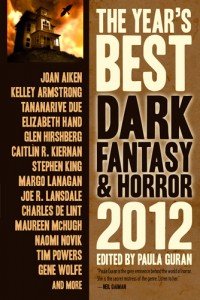 An Interview by Stacey Friedberg
An Interview by Stacey Friedberg
“Objects In Dreams May Be Closer Than They Appear” by Lisa Tuttle will be appearing in Prime’s forthcoming Year’s Best Dark Fantasy & Horror: 2012 edited by Paula Guran. Pre-order here!
You hint that this house is a local legend – at least a few people in town seem familiar with it, yet none share its story with the reader. Did you always have a backstory in mind, or did this simply evolve as you wrote?
The idea for my story came from a legend I vaguely remembered reading somewhere about an area where people glimpse a sort of “mirage” of a house, which appears to be not far away, in the next valley, yet when they try to reach it, they can never get closer. I don’t recall any rationale being offered for why this house should appear, or why some people but not others would see it – basically, there is no “back story” to the house, which might be described as an optical illusion. No one has ever been able to find it or explain how the mirage/illusion happens. When I was asked to write a haunted house story, this came to mind – I thought of the appearing/disappearing house in the distance as a sort of “ghost house” and it appealed to me as a twist on the usual haunted house story – the house itself is the ghost. Yet when I tried to find my original source – I thought it must be in one of the many books I have about British folklore and legends – I couldn’t; eventually I started to wonder if I might have imagined it! So there’s another twist: not just the house, but even the legend about the house that always remains in the distance cannot be found.
So much of this is about what could have been – the failed marriage, the cottage that never lived up to its potential, the careers that never took off. What drew you to these topics?
I never begin a story with the idea of exploring a topic or a theme. So that’s not what drew me. I start with an image or a notion (like, the house seen in the distance) and then characters in a particular situation that seems to connect to this image/idea (a couple searching for their ‘perfect house’) and go on from there. I wanted (or was compelled!) to set the story in Devon, where I lived, a long time ago, with my first husband. So there was an actual not-perfect country cottage and a real failed marriage – also fond memories of driving around the West Country looking at houses and trying to imagine the lives we might live in them – behind the fictional events of the story. What intrigued me was the question of what might happen if someone ever found the house that can’t be found.
In your mind, does our narrator ever escape from the house?
How can anyone escape from a place that does not exist? She’s trapped forever, I’m afraid; the price she has to pay for pursuing the impossible.